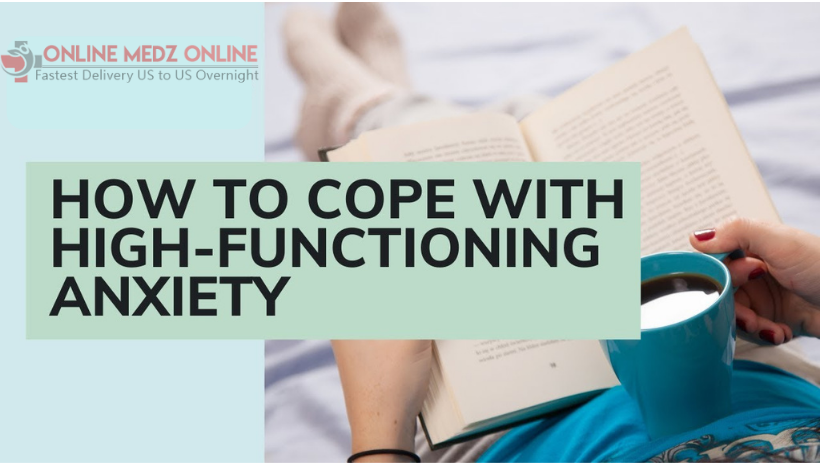
How to Cope with High-functioning Anxiety?
Some people with anxiety may do well at work and define themselves as high functioning. These people are likely to excel at sports or other aspects of their lives. Even after this, individuals living with this type of anxiety can experience several challenges.
People with high functioning anxiety have many symptoms similar to anxiety, such as overthinking, excessive fear, and worry, together with poor sleep. Effective treatment options are available for all anxiety types.
This blog will help you understand this mental health condition better. It includes an overview of medical illness, causes, symptoms, and tips for coping with high functioning anxiety.
All you need to know about high-functioning anxiety
The medical community does not consider high functioning anxiety as a distinct anxiety disorder. However, some individuals with anxiety symptoms say they are overactive or functioning more than ever. They believe in stressing a good thing and more of a driving force. These people manage to perform better in their day-to-day lives.
It is possible that these people may experience mild impairment or they experience subclinical anxiety. Subclinical anxiety is when individuals do not meet diagnostic criteria of this mental health condition but still have anxiety symptoms. Signs of this anxiety type may include mild, atypical, hidden, or brief but recurrent stress.
If you have high functioning anxiety, you might be good at hiding your emotions from others and appear as a calm and confident person. This anxiety can drive you to achieve more rather than hold things back.
From the inside, you may feel worried or scared with obsessive thoughts. You may experience an inability to stay relaxed because of consistent overthinking. Also, the anxiety symptoms may affect your sleep or appetite. High functioning anxiety can adversely affect your health and relationships for a prolonged duration.
Causes of high functioning anxiety
Considering this mental condition over productive, there is a lack of research. Medical professionals and researchers may not know the causes; however, it may be similar to the anxiety disorders present in some people.
While experts do understand what causes this health condition, one may believe that they most likely occur because of a combination of some factors, such as:
- Personality: Shyness or nervousness since childhood increases the risk of anxiety disorders
- Genetics: People with a family history of mental health conditions such as anxiety disorders are more likely to develop anxiety
- Exposure to stress: Experiencing excessive stress or trauma at any point can put you at risk of anxiety
- Alcoholism or any other substance use disorder: Misuse of drugs or alcohol increases the risk of anxiety, as can withdrawal from several substances
- Other health issues: Underlying health concerns, such as thyroid or heart conditions, can trigger or worsen the pre-existing anxiety symptoms. Having another mental health condition can also make you prone to anxiety disorders.
High functioning anxiety signs and symptoms
Anecdotal reports suggest that people with high functioning anxiety may experience fewer symptoms that affect their functioning ability. While they may have chronic anxiety disorder symptoms, these may occur on the moderate end of the spectrum. Possible signs and symptoms can include:
- fear, worry, and anxiety
- overachieving, an inability to relax
- irritability and frustration
- a need for perfection, fear of failure or judgment
- an excessive urge to stay busy every time, overthinking and overanalyzing
- elevated heart rate and rapid breathing, primarily due to anticipatory anxiety
- changes in appetite, digestive issues, sleep problems
Some practical ways to cope with high functioning anxiety
Recognize the symptoms
Mental health conditions are biological; see the behavior changes and patterns. Understand why you ruminate over a simple decision, overprepare for a meeting, or obsessed over a topic or conversation.
Perceiving the manifestations is the initial step to seeking treatment. Understanding the thought and behavior patterns may help you cut off the worries. Try saying that it is okay to have anxiety and accept that it might be challenging, but you have to focus your energy on yourself.
Join hands with your fear
If you have anxiety, become friends with fear. Whether you like it or not, fear is going to be a part of your life. It would help if you tried to understand the nature of your fear as it motivates so much what you do.
One can say that anxiety can’t be pretended away or ignored. You can take the help of a therapist to stop looking fear in the face. Rather than feeding it with more anxiety, work on understanding where it is coming from.
Reconnect with your body
Anxiety is as physical as mental since people with anxiety tend to live in their minds and find it challenging to break the vicious circle of fearful thinking and feeling. If you keep doing mental work without performing any physical activity, you are stuck physically and mentally.
To reconnect with the body, you may try deep breathing regularly, relax your muscles, take short breaks from work, stretch at your desk, or walk outside during lunch breaks. Having a healthy relationship with the body can help you in several ways; it can channel your nervous energy into a more positive direction.
It’s your Life: Learn to intervene.
Once you identify the symptoms and patterns, you may learn to intervene when the attacks appear and step out of them before getting caught over. Remember that anxiety feeds off anxiety, similar to a giant snowball rolling over downhill.
If you find it difficult to make even small decisions, such as choosing clothes or picking out a dishwasher detergent, walk away from the specific situation for a short period before anxiety starts rising.
Learning to moderate your emotions and behavior patterns in response to anxiety can prove beneficial, becoming the critical element to managing the anxiety symptoms. Moreover, it can reduce your overall level of stress.
